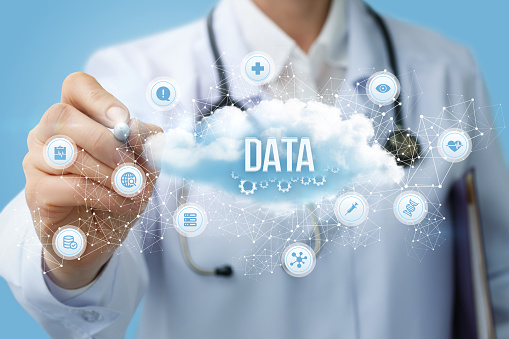The Cloud is a type of advanced technology that allows information or data to be stored online. In the healthcare industry, patient records and data are stored in the Cloud because it’s much more convenient; data is accessible from any device or location.

This information may include clinical information, patient diagnoses, test results, pharmacy information, patient billing, and much more. Obviously, there are a number of advantages to using the Cloud, but also many challenges. For instance, having millions of patient records in the Cloud poses a threat from hackers. They’ve become quite good at infiltrating even the best Internet security programs. It’s scary to think that cyber thieves have the healthcare information of any individual, much fewer millions of people. Therefore, issues of security are of paramount consideration when healthcare organizations consider the Cloud as a way of managing the data of their patients and clients.
Any good innovation has its pros and cons. This article will outline a few advantages and issues with using Cloud Computing in the healthcare industry.
Advantages of Cloud Computing to the Health Care Industry
Collaboration
The Cloud makes it possible for people to share information in real-time. Sometimes doctors do consultations with specialists on the phone. But imagine this, using the Cloud, a panel of neurosurgeons can have discussions in real-time from wherever they are! Information is shared instantly. Everyone can voice their opinion. Important topics can be discussed just as if the whole panel of doctors was gathered in a briefing room at a hospital. This is truly incredible when you think about it. This saves time and money, plus it allows specialists to come together and talk about important research or a specific medical case that has baffled doctors. This method is much more effective and convenient than exchanging emails or talking on the phone.
Another scenario is where a patient needs prescription drugs from a store but cannot get them without a doctor giving out the prescription. The pharmacist can dispatch patient information using cloud features and a patient can get the prescription without having to go to their doctor. This will clearly save time and money for everyone.
Speed
Most of the Cloud-based tools can be upgraded and improved quickly. It doesn’t cost a lot to do this. While the system is upgrading, there is minimum interruption; you might not even notice it. Important information such as a patient’s recent test results can be given priority to gain even faster access.
Mobility
The fact that cloud tools can be installed on any smart device ensures that anytime anywhere, a healthcare provider can dispatch information about a patient. In the future, doctors will see their patients in a virtual setting that is enabled by Cloud technology. Doctors will be able to stay in touch with their patients. All patient information can be quickly accessed, giving the patient a fast, convenient way to “see the doctor” without having to leave home.
This is possible right now with Cloud technology. Phones and tablets can be used just the same as a computer. The service care provider and staff could also work from any location since they are able to access information in the Cloud. Someday, it may not be necessary for a doctor to have an actual office to work from.
Security and Privacy
As already discussed above, patient data must always be protected by the strongest possible measures. This part of patient care is just as important as saving lives. It must be kept completely secure. The Cloud has many strategies and plans in place that ensure the security of patient data. There are standards set by the Health Insurance Portability and Accountability Act (HIPAA). Today’s medical practices must comply with HIPAA regulations. This means that healthcare providers are using the most up-to-date security solutions to guard and protect patient data.
Affordable
Cloud computing providers undertake the task of installing software, as well as its maintenance. Outsourced IT providers typically offer plans that include all upgrades, security, and maintenance so that the healthcare institution and doctors don’t have to worry about spending extra money and time on this. Most healthcare providers simply don’t have the time, expertise, or staff to perform all these tasks on their own. They need an IT specialist who can guarantee that all the big and small issues are addressed on a regular basis. This keeps everything running like clockwork and helps to prevent data breaches.
Cyber thieves are now targeting hospitals and doctors because the data they can steal is so valuable. It can be sold on the Dark Web for a handsome profit.
Wrap Up
Healthcare services are generally geared towards improving service delivery to patients. The technology is now available to give everyone good care at an affordable price. With the Cloud, there are many benefits and a few challenges, the major one being security. However, the Cloud is affordable, fast, efficient, reliable, and secure when managed correctly and this is exactly what the healthcare industry needs today.




Follow eSOZO on Social Media